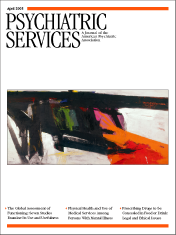To the Editor: In the Personal Accounts column in the January issue, Joy S. McDiarmid (
1) described how she received a total of 60 electroconvulsive therapy (ECT) treatments. I am certain that the only reason that this account was allowed to be published is that the author's experiences were in the 1960s, which sets the stage for a chorus from the ECT industry that "it's not like that anymore."
The truth is that survivors of the more powerful ECT in the 1980s, 1990s, and today still experience scrambled brains: permanent severe memory loss and permanent cognitive disability (
2,
3,
4). As a result of the lost years and lost abilities, ECT permanently alters our lives and the lives of our families in a way that none of us was warned about and none of us would have chosen.
I had a course of modern ECT a quarter-century after Ms. McDiarmid's, at the age of 25. I lost all memory of five years of my life, the most crucial years, from what I've been told; they encompassed my college education. To regain the knowledge I lost—if I could have done it—would have taken another five years. But ECT lowered my IQ by one-third, and left me with permanent anterograde amnesia (diminished short-term memory and learning ability). The career and future I'd worked toward were lost.
I spent the next five years struggling to figure out what had happened to me and then more years trying to find out whether anything could be done to help me. Those were lost years just as truly as the years that were erased. The biggest obstacle to my rebuilding a life was professionals' denial of the brain damage and disability caused by ECT. Nothing untoward happened to me, according to the psychiatrists. But I couldn't remember, couldn't think clearly, couldn't learn. Finally I found a neuropsychologist courageous enough to diagnose brain damage from ECT. No survivor of any other type of brain trauma has to spend years simply trying to assess her losses and gain access to rehabilitative services.
Those 15 state-of-the-art, brief-pulse ECT treatments left a huge hole of more than ten years in my life, but they didn't take only my past; they stole my future.
Like Ms. McDiarmid, I would hope that today's ECT patients are given full and truthful information about ECT's permanent adverse effects and experience fewer "surprises that can affect a lifetime." However, a great deal of evidence indicates that this is not so (
2,
3,
4,
5). A literature review of 17 articles and 134 firsthand accounts that was recently published in the
British Journal of Psychiatry found that half of ECT patients reported receiving inadequate or insufficient information about the procedure (
4). The authors further noted that "the same themes arise whether the patient had received treatment a year ago or 30 years ago" and that "the proportion of people who feel coerced into ECT has increased with time."

